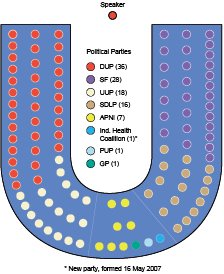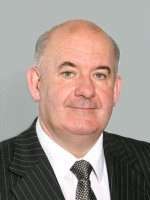Factsheet 3
The Role of the Speaker
The Speaker is the Presiding Officer of the Northern Ireland Assembly. He chairs the Assembly Commission, which is responsible for ensuring the Assembly has the property, staff and services required to carry out its work.
The Speaker also chairs the Assembly Business Committee. This Committee is responsible for agreeing the business to be discussed on the floor of the House.
Electing the Speaker
Members of the Assembly vote on a cross-community basis to elect a Speaker. Once elected, the Speaker holds office until the conclusion of the next election for Speaker, unless he resigns or ceases to be an MLA.
Authority of the Speaker
The chief characteristics of the office of Speaker are authority and impartiality. All speeches in the Assembly are addressed to the Speaker and his or her choice of Members to speak in debates is not open to dispute.
When giving a ruling or preserving order in the Chamber, the Speaker must be heard in silence. No Member may stand when the Speaker is standing. Comments on the character or the actions of the Speaker may be punished as breaches of privilege.
Members cannot criticise the Speaker in a debate or by any form of proceedings except a substantive motion.

The diagram above shows the ‘blocks’ in the Assembly at the start of the summer recess in July 2007.
Impartiality of the Speaker
Members must be confident of the impartiality of the Speaker. The Speaker does not take part in or vote in any debates in the Assembly. The Speaker does not become involved in party politics, comment on Northern Ireland political matters nor on issues of Government policy.
When speaking on the Assembly’s behalf the Speaker confines himself to operational matters. Similarly, when making statements to the press about the Assembly, he will talk only about factual or procedural matters.
Powers and duties of the Speaker
The Speaker’s duties fall into two main categories: procedural duties and representational duties. The procedural duties arise from the Northern Ireland Act 1998 and the Standing Orders of the Assembly. The representational duties involve, for example, the Speaker receiving visitors to Parliament Buildings, including heads of state, ambassadors and senior politicians from Britain, Ireland and overseas.
In his role as President of the Assembly Branch of the Commonwealth Parliamentary Association the Speaker also takes part in activities to uphold and develop links between Members of the parliaments of Commonwealth countries.
The Speaker also hosts events designed to promote understanding of the Assembly as an institution and which develop links with the wider Northern Ireland community.
Assembly Information
Public Information Service
Northern Ireland Assembly
Parliament Buildings
Belfast, BT4 3XX
NIA General Enquiries
Tel: +44 (0)28 9052 1333
Fax: +44 (0)28 9052 1980
Email: info@niassembly.gov.uk
 William Hay MLA Speaker |
||
|---|---|---|
 John Dallat MLA Deputy Speaker |
 David McClarty MLA Deputy Speaker |
 Francie Molloy MLA Deputy Speaker |
